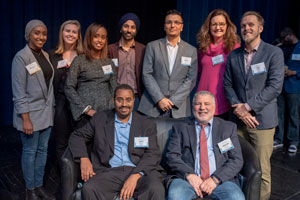On Nov. 10, more than 250 members of the Clarkston refugee and immigrant communities, Emory and Georgia State University (GSU) researchers and volunteers, and community organization representatives met at GSU’s Clarkston campus to learn from each other and lay a foundation for future engagement around multiple important issues affecting these communities.
This conference, dubbed the Clarkston Summit, was the kick-off event for the recently established Refugee & Immigrant Health and Wellness Alliance (RIHWA), a partnership among the Emory Global Health Institute (EGHI), Georgia State University, Kaiser Permanente of Georgia, the DeKalb County Board of Health, numerous refugee resettlement agencies, and many other organizations working with refugees and immigrants in Clarkston.
Heval Kelli, MD, a Kurdish refugee from Syria who came to Clarkston after 9/11 and is now a cardiology fellow at Emory, first envisioned the Summit in 2016 with Mary Helen O’Connor, director for the Center for Community Engagement at GSU’s Perimeter College. Parminder Suchdev, EGHI associate director and professor of medicine and public health at Emory University, discussed with Kelli the idea of an Emory collaboration on the project in 2017. In May 2018, Kelli, O’Connor, and Suchdev revisited the idea for the Summit, and it took flight.
“Ever since we met in a Clarkston grocery store more than two years ago, Heval and I have dreamed of creating an event like the Summit. We firmly believed that bringing all of the assets of the community together would result in stronger collaborations and ultimately better support for all community members. As co-chairs of the Summit, we are both thrilled with the feedback we are receiving from the participants and are excited about what’s next,” says O' Connor.
The Summit began with a plenary session and panel discussion that included Clarkston Mayor Ted Terry and City Councilman Awet Eyasu, 11Alive News reporter Neima Abdulahi, and CDC researcher Martin Cetron.
Cetron, an expert in international migration, explained the current status of migration to the U.S. and other parts of the world and the role that the CDC plays in ensuring that all refugees who resettle in the U.S. are healthy. He explained that the U.S. receives a small proportion of refugees relative to other countries. In his remarks, Mayor Terry suggested that Clarkston is a future glimpse of America given its diversity and the strength that this diversity brings to the community.
Councilman Eyasu and Abdulahi both came to the U.S. as refugees and provided their perspectives on arriving in the U.S. and learning to live in a new culture. Eyasu described his journey from refugee to Clarkston City Councilman and that Clarkston’s motto, “Where Possibilities Grow,” is emblematic of the life he has been able to lead.
Abdulahi, who was born in Somalia and resettled in Decatur, Ga. as an elementary school student knowing no English, described how her family would spend weekends in Clarkston because it felt comfortable and a little bit like home. During her remarks, she also indicated that the biggest challenge for her was learning what resources were available and finding mentors to guide and push her.

Back row left to right
Manal Sidi, RSPH student and EGHI Graduate Research Assistant
Lucy Whitehead, RSPH student and EGHI Graduate Research Assistant
Neima Abdulahi, Reporter, 11Alive News
Parminder Suchdev, EGHI Associate Director, Professor at SOM and RSPH
Heval Kelli, Cardiology Fellow, EU SOM
Mary Helen O’Connor, Director, Center for Community Engagement, GSU Perimeter College
Ted Terry, Mayor, City of Clarkston
Front row seated left to right
Awet Eyasu, Councilman, City of Clarkston
Martin Cetron, Director, Division of Global Migration and Quarantine, CDC
The fact that the Clarkston Summit attracted so many stakeholders early on a cold Saturday morning is testament to the hard work of the planning committee, which included representatives from Emory, GSU, the CDC, the International Rescue Committee, and Sagal Radio. Britton Tuck, EGHI Program Associate and logistics chair for the committee, will be compiling data gathered during the Summit as preparation for RIHWA’s next steps.
After the panel discussion, Summit attendees participated in breakout sessions that focused on business development, legal issues, education, mental health, women’s health and healthcare access. The event culminated with an expo where community organizations advertised their services and attendees had an opportunity to informally network.
Like O’Connor, Kelli was pleased with the Summit. “We all came together from various fields, experiences, and communities to meaningfully serve each other so that we can serve the underserved community in sustainable ways,” he says.
Suchdev agrees. “We are really excited that the turnout for the Clarkston Summit was as large as it was and that everyone who attended was engaged and had a positive response to our bringing so many different stakeholders together. We are also grateful to Kaiser Permanente of Georgia for supporting the planning process that led to the development of RIHWA and to all of our partners, especially GSU. We are looking forward to examining the information we collected during the Summit to see what we should focus on that would most benefit Clarkston.”

